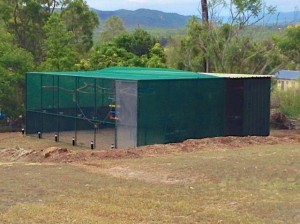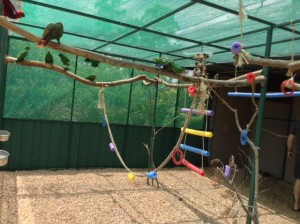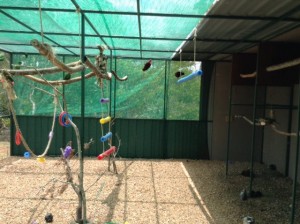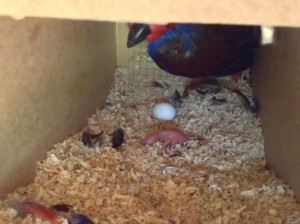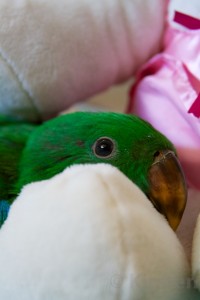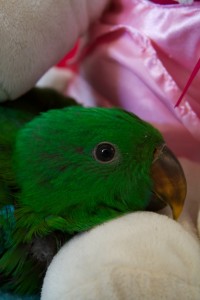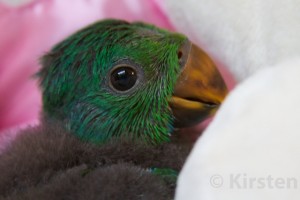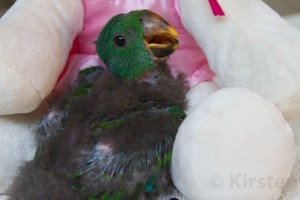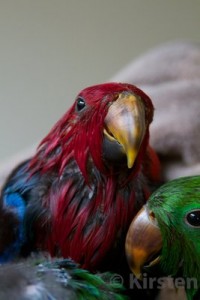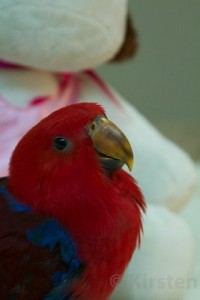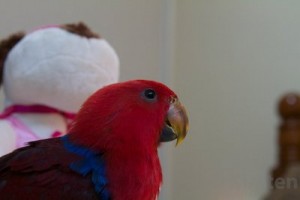Care for your Eclectus during their molt
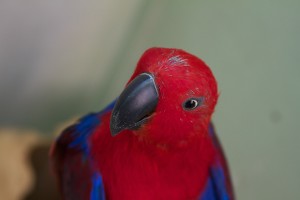
After shivering through the cold winter months, Summer is finally here. It is a time for sunshine, weekend barbecues and relaxing by the pool. It is also the time when our Eckies begin to molt.
Parrot Haven is home to 25 Eckies and one precocious yet very special African Grey parrot and at the moment, all our feathered kids are molting. Our place is decorated with scatterings of feather casings, white fluffy down and the odd primary or two. The aviary is a variable smorgasbord of feathers, from tiny petite head feathers to beautiful tail plumage.
This happens twice year at Parrot Haven however the pre Christmas molt is always the heaviest. Molting can certainly take it’s toll on our parrots. I can only imagine how irritating it must be walking around like a pin cushion, as hundreds of new feathers erupt through the skin.
As parrot slaves, we must understand that molting affects our kids moods, dietary needs, appetite and even sleep patterns. It certainly takes a toll on our kids bodies and we must do all we can to ease our kids through this time.
What is molting?
Molting is a process where old feathers fall out and are replaced by new ones. Feathers are made from a protein called keratin, just like our hair and fingernails. Unlike skin, keratin is unable to repair itself. If a feather is damaged or frayed, it will remain that way until the parrot molts.
The importance of protein
When a parrot molts, protein is taken from the Eckie’s body. If a parrot is not provided with protein rich foods to supplement this output, their body will be depleted.
An Eckie suffering from protein deficiency will be tired, lethargic and irritable. It will prolong their molt and the newly molted feathers will look dull, lacking their trademark glossiness.
It is very important to feed your Eckie foods which are high in protein, such as:
- Cooked meat and chicken
- Boiled eggs (cooked right the way through)
- Almonds
- Pumpkin seeds (also known as pepitas)
- Lentils and pulses
- Chia
- Asparagus
- Broccoli
- Cauliflower
- Sweet corn
Change in appetite
Molting affects our Eckies’ appetites. Some kids become ravenous eating machines, while others become very fussy eaters, craving certain foods and rejecting others. Monitor your Eckie’s appetite carefully when molting, and take note of specific foods they crave. Our feathered kids listen to their bodies, and will source foods that will help ease them through molting.
Moodiness
Molting can make the demurest of Eckies cranky and short tempered. Their body is working in overdrive to produce hundreds of pin feathers and many become irritable. Please, do not take this personally as many people have experienced this with their feathered kids.
My hen, Red, is terribly short tempered while molting. I know there is very little room for error and if I mis-read her body language, I will receive a nasty bite. As much as this hurts, I don’t take this personally. I know that once she has finished molting, she will return to her sweet self.
Everyone copes with their Eckie’s moods differently. Some ignore cranky behavior, leaving their kid alone until they are in a better frame of mind. Others distract their Eckie by offering a new toy or food treats.
Some Eckies become little sooks. They seek the love and comfort of their owner and demand cuddles and affection. This too is normal. Some of our hens seek extra cuddles while molting. Once they have molted their neediness reduces and their moods return to normal.
Aloe spritzes
Aloe spritzes help moisturize the skin, keeping it soft and supple. This allows the developing pinfeathers to break through the skin more easily. It is simple and cheap to make.
We buy 100% pure aloe gel from our local health food store. We then put 1 tablespoon of aloe into a spray bottle and fill it with a cup of warm water. Our kids love being misted by the warm, moisturizing water, and the aloe gives their feathers a spectacular sheen.
Some people choose to use a pre-mixed aloe drink. Please ensure there are no additives before using this.
Sleepy time kids
Molting takes its toll on our kids’ small bodies. It takes a lot of energy to grow hundreds of feathers, and our Eckies become tired and lethargic. Your Eckie’s sleep routine may change around molting time. Many will take long catnaps during the day. Others will want to go to bed earlier, or sleep in. They need this extra sleep; it helps the body recuperate, so when playtime rolls around, they are re-energized and ready for fun.
Lots of extra love
Molting is a stressful time for our feathered kids. They feel itchy and out of sorts. Some kids become despondent when they molt. They know they look scruffy and it really upsets them. They are such sensitive little souls.
As devoted Eckie parents, we want to do everything we can to help our kids through this difficult time. So let’s give our molting kids an extra special treat to show them how much we care. It will make your Eckie feel very special.
For more information about the Eclectus Diet please visit our website
The Ultimate Guide to Eclectus Parrots contains 380+ pages of content dedicated to assisting owners care for their Eclectus.
It contains chapters on The Eclectus molt, diet, training, emergency care, bonding and much, much more
.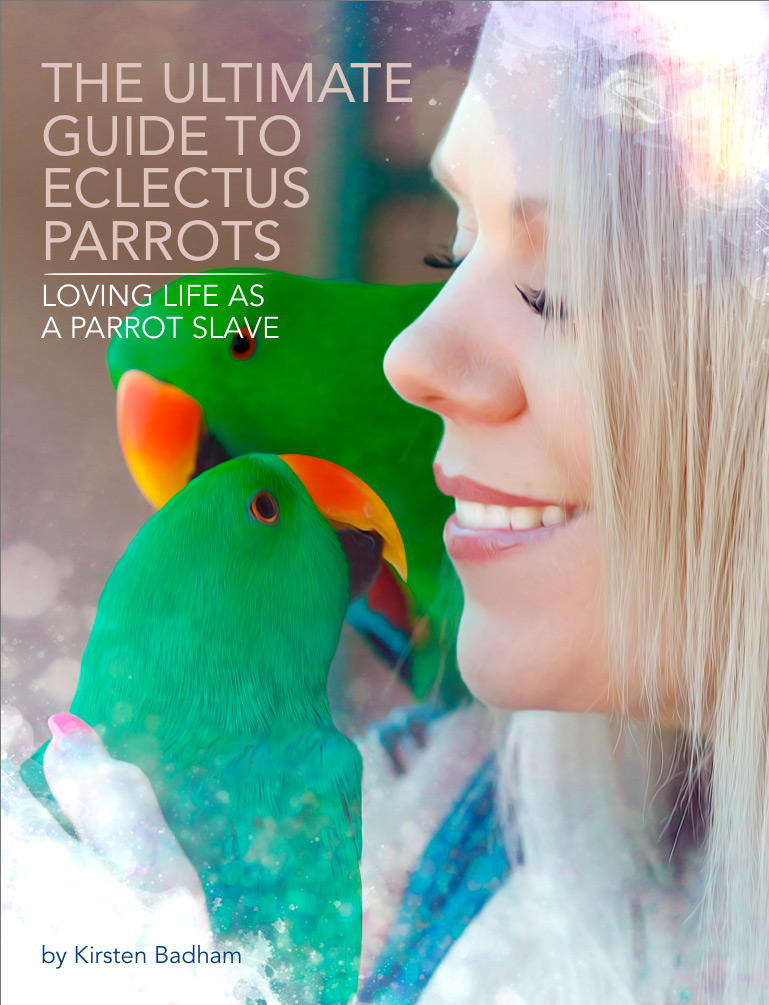



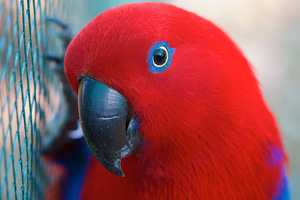
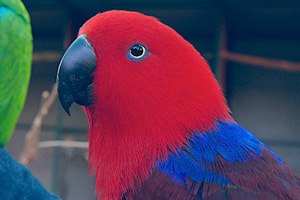

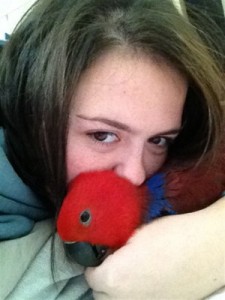
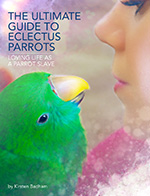




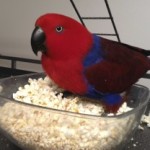 Red on the other hand showed a great deal of interest in where ‘Mum & Dad’ lived and soon began lifting her foot up and looking up at the house when we would visit with the kids. We brought her a travel carrier which she stepped into quite happily and we brought her inside with us. Ever since then she has been an amazing pet. She helps Kirsten cook meals, prepare the fruit and veg that we feed the kids every day and she quite happily perches next to us when we work inside. She showers regularly with us and her vocabulary has grown amazingly!
Red on the other hand showed a great deal of interest in where ‘Mum & Dad’ lived and soon began lifting her foot up and looking up at the house when we would visit with the kids. We brought her a travel carrier which she stepped into quite happily and we brought her inside with us. Ever since then she has been an amazing pet. She helps Kirsten cook meals, prepare the fruit and veg that we feed the kids every day and she quite happily perches next to us when we work inside. She showers regularly with us and her vocabulary has grown amazingly!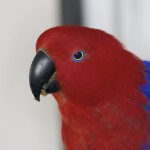 Kirsten has tried very hard over the years to balance her breeding technique with an insight into what the parrots experience. Being empathic is a good way to live not just when it comes to human relationships. While her method may be non-traditional from a breeding standpoint, the results speak for themselves. We both have the most amazing companion parrot in part due to the way Kirsten has raised and cared for her all these years.
Kirsten has tried very hard over the years to balance her breeding technique with an insight into what the parrots experience. Being empathic is a good way to live not just when it comes to human relationships. While her method may be non-traditional from a breeding standpoint, the results speak for themselves. We both have the most amazing companion parrot in part due to the way Kirsten has raised and cared for her all these years.